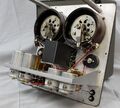1603-A: Difference between revisions
Jump to navigation
Jump to search
No edit summary |
No edit summary |
||
| Line 13: | Line 13: | ||
{{Catalog History}} | {{Catalog History}} | ||
}} | }} | ||
The | The {{Title|General Radio 1603-A}} is a Z-Y impedance bridge introduced in {{Catalog O}} that remained available through {{Catalog T}}. | ||
Known as ''the bridge that always has an answer'', its claim to fame is that it can be balanced for any impedance connected to its terminals. The 1603-A is accurate at audio frequencies from 20 Hz to 20 kHz. It requires an audio oscillator and detector for operation. | Known as ''the bridge that always has an answer'', its claim to fame is that it can be balanced for any impedance connected to its terminals. The 1603-A is accurate at audio frequencies from 20 Hz to 20 kHz. It requires an audio oscillator and detector for operation. | ||
Revision as of 11:33, 5 April 2024
The General Radio 1603-A is a Z-Y impedance bridge introduced in Catalog O (1956) that remained available through Catalog T (1968).
Known as the bridge that always has an answer, its claim to fame is that it can be balanced for any impedance connected to its terminals. The 1603-A is accurate at audio frequencies from 20 Hz to 20 kHz. It requires an audio oscillator and detector for operation.
The 1603-A directly measures the quadrature components of a complex impedance Z = R + jX, or a complex admittance Y = G + jB. The unknown Z or Y may lie in any of the four quadrants of the complex plane, since this bridge can measure both positive and negative values of R and G as well as X and B.
Specifications
- Frequency Range: 20 Hz to 20 kHz
- Impedance and Admittance: -infinity to +infinity
- Accuracy (with unknown grounded): 1% (see manual)






